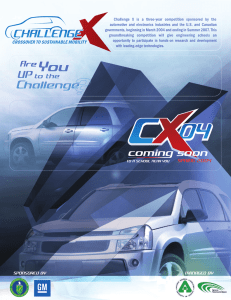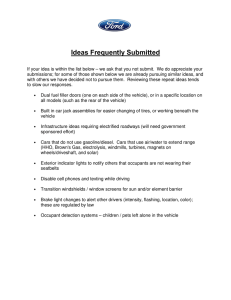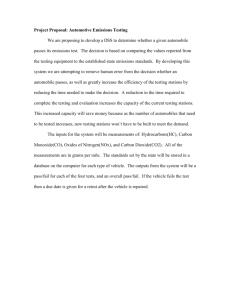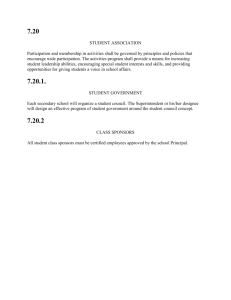A Competition Like No Other
advertisement
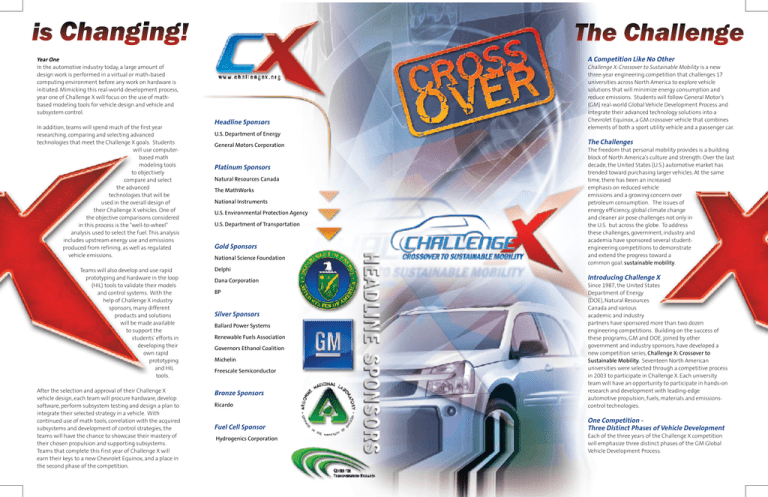
A Competition Like No Other Year One In the automotive industry today, a large amount of design work is performed in a virtual or math-based computing environment before any work on hardware is initiated. Mimicking this real-world development process, year one of Challenge X will focus on the use of mathbased modeling tools for vehicle design and vehicle and subsystem control. In addition, teams will spend much of the first year researching, comparing and selecting advanced technologies that meet the Challenge X goals. Students will use computerbased math modeling tools to objectively compare and select the advanced technologies that will be used in the overall design of their Challenge X vehicles. One of the objective comparisons considered in this process is the "well-to-wheel" analysis used to select the fuel. This analysis includes upstream energy use and emissions produced from refining, as well as regulated vehicle emissions. Teams will also develop and use rapid prototyping and hardware in the loop (HIL) tools to validate their models and control systems. With the help of Challenge X industry sponsors, many different products and solutions will be made available to support the students' efforts in developing their own rapid prototyping and HIL tools. After the selection and approval of their Challenge X vehicle design, each team will procure hardware, develop software, perform subsystem testing and design a plan to integrate their selected strategy in a vehicle. With continued use of math tools, correlation with the acquired subsystems and development of control strategies, the teams will have the chance to showcase their mastery of their chosen propulsion and supporting subsystems. Teams that complete this first year of Challenge X will earn their keys to a new Chevrolet Equinox, and a place in the second phase of the competition. Headline Sponsors Challenge X: Crossover to Sustainable Mobility is a new three-year engineering competition that challenges 17 universities across North America to explore vehicle solutions that will minimize energy consumption and reduce emissions. Students will follow General Motor's (GM) real-world Global Vehicle Development Process and integrate their advanced technology solutions into a Chevrolet Equinox, a GM crossover vehicle that combines elements of both a sport utility vehicle and a passenger car. U.S. Department of Energy General Motors Corporation Platinum Sponsors Natural Resources Canada The MathWorks National Instruments U.S. Environmental Protection Agency U.S. Department of Transportation Gold Sponsors National Science Foundation The Challenges The freedom that personal mobility provides is a building block of North America's culture and strength. Over the last decade, the United States (U.S.) automotive market has trended toward purchasing larger vehicles. At the same time, there has been an increased emphasis on reduced vehicle emissions and a growing concern over petroleum consumption. The issues of energy efficiency, global climate change and cleaner air pose challenges not only in the U.S. but across the globe. To address these challenges, government, industry and academia have sponsored several studentengineering competitions to demonstrate and extend the progress toward a common goal: sustainable mobility. Delphi Dana Corporation Introducing Challenge X Ricardo Since 1987, the United States Department of Energy (DOE), Natural Resources Canada and various academic and industry partners have sponsored more than two dozen engineering competitions. Building on the success of these programs, GM and DOE, joined by other government and industry sponsors, have developed a new competition series, Challenge X: Crossover to Sustainable Mobility. Seventeen North American universities were selected through a competitive process in 2003 to participate in Challenge X. Each university team will have an opportunity to participate in hands-on research and development with leading-edge automotive propulsion, fuels, materials and emissionscontrol technologies. Fuel Cell Sponsor One Competition Three Distinct Phases of Vehicle Development BP Silver Sponsors Ballard Power Systems Renewable Fuels Association Governors Ethanol Coalition Michelin Freescale Semiconductor Bronze Sponsors Hydrogenics Corporation Each of the three years of the Challenge X competition will emphasize three distinct phases of the GM Global Vehicle Development Process. Participating Schools Michigan Technological University Years Two and Three The final two years of Challenge X will build upon the modeling and testing results from year one. Each university team will integrate and refine their advanced powertrain and other vehicle subsystems into their Equinox. Year two will focus on powertrain development and demonstration of the energy use and emissions goals of the competition. Year three will require further refinement of the vehicle with the goal of delivering a "showroom" vehicle that addresses the requirements of consumers. At the conclusion of each competition year, teams will be judged on their execution, progress toward meeting the Challenge X goals and ability to predict their performance using math-based tools. Unique Approach to Engineering Education Challenge X is a unique student engineering competition with a groundbreaking approach to engineering education. Teams will follow a real-world approach modeled after GM's Global Vehicle Development Process. This process gives students valuable experience in real-world engineering practices, resource allocation and meeting deliverables. And, while previous student engineering competitions focused primarily on hardware modifications, Challenge X includes a unique focus on modeling and simulation, as well as subsystem development and testing. By broadening the technical focus of the competition to include more aspects of the entire vehicle development process, the university teams will have a greater opportunity to expand their learning and refine their vehicle solutions. Unparalleled Resources Participating teams will be provided with a variety of resources to help achieve their objectives, including substantial technical support and mentoring from GM and other sponsors. Each team will also receive a 2005 Chevrolet Equinox, $10,000 in seed money, up to $25,000 in additional production parts from GM and considerable software and hardware donations from other sponsors. Teams will foster their business development and fundraising skills as they are tasked to solicit additional support to finance their projects. Government and Industry Sponsors GM and DOE are the headline sponsors of Challenge X, providing major funding, mentoring and product donations. The MathWorks will provide the latest computer modeling simulation tools and training and National Instruments will provide the instrumentation and control tools for subsystem development and testing. Other major support will be provided by the Canadian federal government through Natural Resources Canada. Argonne National Laboratory, a DOE Research and Development facility, will provide competition management, team evaluation and technical and logistical support. Other government agencies, such as the U.S. Environmental Protection Agency and the U.S. Department of Transportation, will provide expertise in emissions measurement, corporate average fuel economy (CAFÉ) standards and safety. Finally, other co-sponsors will contribute such key elements as fuel cells, propulsion systems, fuels, emissions technology and raw materials. Sponsor and Student Benefits Sponsors have the opportunity to meet, work with and recruit hundreds of the nation's most motivated and talented engineering students. They provide product donations, training and support to the teams so students can integrate these technologies into the competition vehicles. As a result, sponsors are able to observe how their products perform during rigorous and innovative use and students gain access to the latest software and newest vehicle technologies that might otherwise be unavailable or too expensive. Unlike traditional textbook learning, Challenge X gives students hands-on experience in a real-world vehicle development process that will better prepare them for careers in the automotive industry. As students struggle to overcome significant program obstacles and technical challenges, they also build leadership and teamwork skills, not only in engineering but also in business development, fundraising, and public relations. Questions? Contact: Kristen De La Rosa Challenge X Project Manager Argonne National Laboratory kdelarosa@anl.gov 512 - 481 - 8876 Mississippi State University Ohio State University Pennsylvania State University Rose-Hulman Institute of Technology San Diego State University Texas Tech University University of Akron University of California, Davis University of Michigan University of Tennessee University of Texas at Austin University of Tulsa University of Waterloo University of Wisconsin-Madison Virginia Tech West Virginia University
